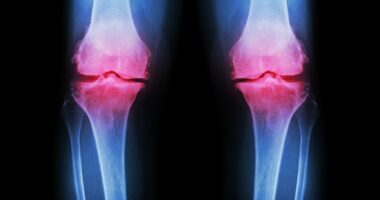Share this @internewscast.com
Around five percent of British people suffer from a silent killer disease with virtually no symptoms. The liver is one of our vital organs that carries out more than 500 bodily functions, including converting food into energy and removing toxins from the blood.
Therefore, any problems with the liver can be dangerous. One common issue with the liver is a build-up of fat in the organ.
It is thought one in three adults in the UK are living with small amounts of fat in the liver. If allowed to get worse this can develop into fatty liver disease, also known as non-alcoholic fatty liver disease.
In its later stages, fatty liver disease can lead to cirrhosis, liver failure and even death. That’s why it is vital that it is caught as soon as possible.
However, part of what makes this condition so deadly is the fact it doesn’t always display symptoms.
According to the NHS, you are also most at risk of fatty liver disease if you are aged over 50.
The health body also explains how there are “not usually any symptoms” of fatty liver disease in the early stages.
“You probably will not know you have it unless it’s diagnosed during tests carried out for another reason,” it says.
If someone were to experience any symptoms these would only occur in the “more advanced stages” and are “occasional”.
These include:
- A dull or aching pain in the top right of the tummy (over the lower right side of the ribs)
- Extreme tiredness
- Unexplained weight loss
- Weakness.
However, if the condition develops to cirrhosis, which is the most extreme stage of the disease, other signs can become apparent.
The NHS explains: “Cirrhosis is scarring (fibrosis) of the liver caused by long-term liver damage. The scar tissue prevents the liver working properly.”
If cirrhosis develops, you could experience:
- Yellowing of the skin and the whites of the eyes (jaundice)
- Itchy skin
- Swelling in the legs, ankles, feet or tummy (oedema).
“See a GP urgently or call 111 if you have any of these symptoms and have a liver condition,” the NHS adds.
Data published last year revealed a staggering increase in the number of hospital admissions due to liver disease in England.
As reported by Express.co.uk, figures from the Office for Health Improvement and Disparities showed there was a 22 percent increase in liver disease hospital admissions from 2021 to 2022.
More specifically, there were 82,290 admissions in 2022 compared to 67,458 the year prior.
And compared to in 2012, hospital admissions due to liver disease increased by almost 47 percent.
As well as being aged over 50, there are other factors that can increase the risk of a fatty liver. These include if you:
- Are obese or overweight – particularly if you have a lot of fat around your waist (an “apple-like” body shape)
- Have type 2 diabetes
- Have a condition that affects how your body uses insulin
- Are insulin resistance, such as polycystic ovary syndrome
- Have an underactive thyroid
- Have high blood pressure
- Have high cholesterol
- Have metabolic syndrome (a combination of diabetes, high blood pressure and obesity)
- Smoke.
To therefore lower your risk for the disease, the NHS recommends you:
- Lose weight – you should aim for a BMI of 18.5 to 24.9
- Eat a healthy diet
- Exercise regularly – at least 150 minutes of moderate-intensity activity a week
- Stop smoking.














